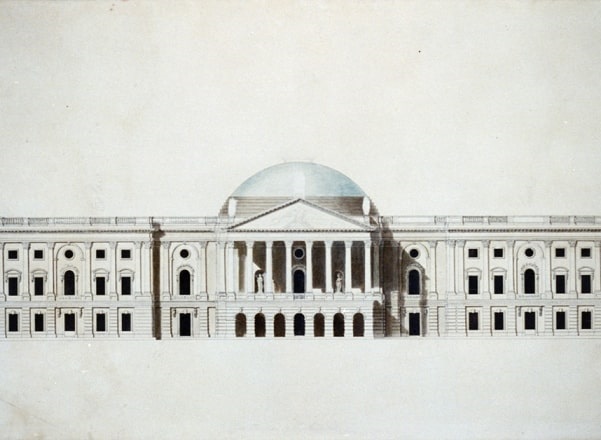Note: This article was scheduled to run yesterday, but was delayed due to technical difficulties.
After convening in Philadelphia, Pennsylvania; Annapolis, Maryland; Trenton, New Jersey; and New York City, Congress finally moved to its permanent location in the Capitol Building in Washington, D.C., on 17 November 1800.

Although the Senate wing was completed, the House wing was still under construction and in fact was not finished until 1811. This did not deter Congress, however; Washington, D.C., was the nation’s capital, the Capitol Building – finished or not – was the seat of Congress, and the U.S. Congress went ahead and held it first session on November 17 as scheduled.
The local citizens were excited that Congress was coming to town, and planned an elaborate parade to celebrate. The Gazette of the United States described the carefully-planned parade.

Here is a transcription of this article:
Washington, Nov. 11.
At a meeting of the committee appointed by the Citizens of Alexandria and Washington for the purpose of making arrangements for celebrating the approaching session of Congress.
Resolved, that it be recommended that on the day the President meets Congress to deliver his speech, a procession move from the President’s House to the Capitol in the following order, viz.
1st An Advanced Guard.
2nd Music.
3rd Sheriff of Prince George county (Maryland).
4th President of the United States and his Secretary.
5th Clergy.
6th Secretaries and Heads of Departments.
7th Commissioners of Washington and their Officers.
8th Mayor and Commonality of Alexandria and their Officers.
9th Mayor and Corporation of George Town and their Officers.
10th Professors and Students.
11th Masonic Lodges.
12th Officers of the Army of the United States.
13th Militia Officers.
14th Militia.
15th Building Mechanics.
16th Citizens.
Resolved, that Messrs. G. Deneale, A. Alexander, J. Hoban and T. Monroe, be appointed to prepare an address to Congress on the occasion.
Resolved, that Gen. Lingan, Col. Deneale and Capt. Stephenson be appointed to marshal the procession.
By order,
L. Harbaugh, Chairman.
The National Intelligencer and Washington Advertiser also provided information about the parade.
Here is a transcription of this article:
Territory of Columbia, November 14, 1800.
The Committees of arrangement, for celebrating the approaching Sessions of Congress in the City of Washington, have adopted a plan of procession, which they recommend being formed in front of the Little Hotel, for the purpose of accompanying the President of the United States to the Capitol on the day he meets Congress to deliver his speech. The plan is calculated to embrace all classes and descriptions of persons who may attend. It is requested of those who chuse [sic] to join the procession in their Corporate, Official, Military, Professional, or Mechanical capacity, to meet at ten o’clock a.m. when they will receive from the Marshals of the day, the necessary information as to the rank or station severalty assigned by the order of arrangement adopted. After the procession a respectful and appropriate address, or communication, from the inhabitants of the Territory to Congress, is contemplated.
The National Intelligencer and Washington Advertiser also ran this sanguine article.
Here is a transcription of this article:
Washington City.
Monday, November 17th, 1800.
The Legislature of the United States meets this day. As they are the grand depositary of National confidence, to whom are entrusted powers, on the correct exercise of which the public felicity greatly depends, it is natural that a general solicitude should accompany their deliberations. Possessing the power of preserving peace or declaring war, of increasing, diminishing or modifying taxes, the welfare of the community, on points of the deepest and most extensive interest, cannot fail to be as much promoted by an enlightened, as it would be injured by a contracted, policy.
Never perhaps did a session of Congress commence under auspices more flattering than those which exist at present.
Note: An online collection of newspapers, such as GenealogyBank’s Historical Newspaper Archives, is not only a great way to learn about the lives of your ancestors – the old newspaper articles also help you understand American history and the times your ancestors lived in, and the news they talked about and read in their local papers.
